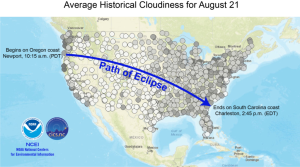This has been a pretty wet summer so far, and that means we probably have a better than usual chance of having some clouds for the eclipse on August 21. Even if the sky is completely cloud-covered, we will still experience effects from the eclipse, in particular the darkness that comes when most of the sun’s disk is blocked out and the concurrent fall in temperature. But even if there are some clouds, there may be breaks that you can use to view the sun, and cloudiness has also been known to change because of the falling temperatures. You can read more in this Forbes.com article by Dr. Marshall Shepherd of UGA here.
